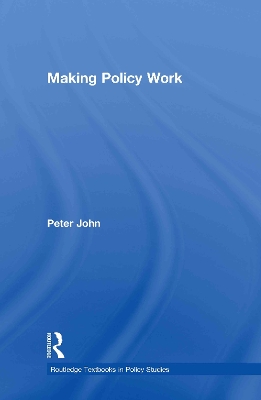Routledge Textbooks in Policy Studies
2 total works
Many tools are on offer to politicians and other policy-makers when they seek to change policy outcomes. Often they choose to concentrate on one set of tools, but fail to see the costs as well as the benefits – and may not consider the available evidence regarding their effectiveness. This innovative new textbook clearly sets out the main tools of government, and provides an analysis of their efficacy when applied to public problems.
Each chapter examines the relative benefits and costs of using a key tool that is available to improve policy outcomes, drawing on a diverse literature, a large number of empirical studies and a range of contexts. Areas covered include:
- governments and policy outcomes
- law and regulation
- public spending and taxation
- bureaucracy and public management
- institutions
- information, persuasion and deliberation
- networks and governance.
Offering a clear and comprehensive evaluation, and highlighting the set of powerful tools commonly available, this text encourages students to consider the most effective combination in order to manage key issues successfully. Including a useful glossary of key terms, this book will be of great interest to all students of public policy, administration and management.
The fully revised and updated new edition of this textbook continues to provide the most accessible overview of the main approaches in the study of public policy. It seeks to review the most common and widely used frameworks in the study of policy analysis:
- institutions
- groups and networks
- society and the economy
- individual interests
- ideas.
The book explains each one, offers constructive criticisms and explores their claims in the light of a variety of American, British and European examples.
Arguing that no one framework offers a comprehensive explanation of public policy; John suggests a synthesis based on different aspects of the approaches, introducing concepts/approaches of advocacy coalitions, punctuated equilibrium and evolution as more effective ways to understand public policy.
Combining both a clear summary of debates in public policy and a new and original approach to the subject, this book remains essential reading for students of public policy and policy analysis.

